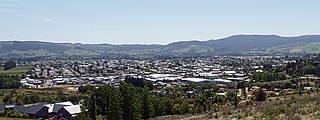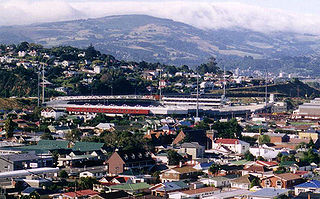Related Research Articles

Dunedin is the second-largest city in the South Island of New Zealand, and the principal city of the Otago region. Its name comes from Dùn Èideann, the Scottish Gaelic name for Edinburgh, the capital of Scotland. The city has a rich Māori, Scottish, and Chinese heritage.

Mosgiel is an urban satellite of Dunedin in Otago, New Zealand, fifteen kilometres west of the city's centre. Since the re-organisation of New Zealand local government in 1989 it has been inside the Dunedin City Council area. Mosgiel has a population of approximately 14,800 as of June 2023. A nickname for Mosgiel is "The pearl of the plain". Its low-lying nature does pose problems, making it prone to flooding after heavy rains. Mosgiel takes its name from Mossgiel Farm, Ayrshire, the farm of the poet Robert Burns, the uncle of the co-founder in 1848 of the Otago settlement, the Reverend Thomas Burns.

Carisbrook was a major sporting venue in Dunedin, New Zealand. The city's main domestic and international rugby union venue, it was also used for other sports such as cricket, football, rugby league and motocross. In 1922, Carisbrook hosted the first international football match between Australia and New Zealand. The hosts won 3-1.

Roslyn-Wakari Association Football Club is an association football club based in Dunedin, New Zealand. They compete in the Southern Premier League.
Taieri College, formerly called The Taieri High School and, prior to 1956, the Mosgiel District High School, is a co-educational state school in Mosgiel, Dunedin, New Zealand.

Ryan Shortland is a former rugby union player who last played for the Newcastle Falcons in the Aviva Premiership. Before switching to rugby union, he previously played rugby league in the NRL.

James Allan was a New Zealand rugby union player who played eight games for the All Blacks, the New Zealand national rugby union team, and was nicknamed the Taieri Giant. Allan played in the first match contested by the New Zealand team, and the New Zealand Rugby Union regard him as the first ever All Black.
Charles Kesteven Saxton was a New Zealand rugby union and cricket player, coach and administrator.
The 1908 New Zealand rugby league season was the first season that rugby league had been played in New Zealand. Auckland played Wellington in a two match series that was won by Auckland 1-0. Otago and Southland also participated in a two match series which was drawn 1-all. Auckland and Taranaki then drew a two match series.

Kevin Lawrence Skinner was a rugby union player from New Zealand who won 20 full caps for the All Blacks, two of them as captain. He was also a heavyweight boxer, winning the New Zealand championship in 1947.

Francis Stevens McAtamney was a New Zealand rugby union player. He was a member of the New Zealand national side, the All Blacks, in 1956 and 1957, playing in the prop position.
The Otago Rugby League Team are New Zealand rugby league team that represents the Otago Rugby League. They are known as the Whalers. In the past they have been nicknamed the Storm, the Raiders and the 45er's.
James Anthony Richard Lentjes was a New Zealand rugby union player. His position was Flanker.
William Robert "Robin" Archer was a New Zealand rugby union player and coach. A first five-eighth, Archer represented Otago and Southland at a provincial level, and was a member of the New Zealand national side, the All Blacks.
Reginald Clive Bell was a New Zealand rugby union player and cricketer. He was a member of the New Zealand national rugby side, the All Blacks, in 1922, playing eight matches. He played four first-class matches for Otago between the 1914–15 and 1920–21 seasons.
Arthur Ernest Berry was a New Zealand sportsman. He played four first-class cricket matches for Otago during the 1955–56 season and played against touring international rugby union sides.
Eric Alexander Watson was a New Zealand rugby union coach and sportsman. He coached the New Zealand national rugby union team for two years, played for the Otago Rugby Football Union, represented Otago at lawn bowls, and played 46 first-class cricket matches for the Otago cricket team.
Alexander McDonald was a New Zealand rugby union player. A loose forward, McDonald represented Otago at a provincial level, and was a member of the New Zealand national side, the All Blacks, between 1905 and 1913. He played 41 matches for the All Blacks including 14 as captain. McDonald played in eight internationals, including the famous "Match of the Century" against Wales. He went on to coach both the Otago and Wellington provincial teams, and was a North Island, South Island and national selector. He co-managed the All Blacks on their 1938 tour of Australia, and was assistant manager for the 1949 South African tour.
John Ronald McNab was a New Zealand rugby union player. A loose forward, McNab represented Otago at a provincial level, and was a member of the New Zealand national side, the All Blacks, in 1949 and 1950, including on their 1949 tour of South Africa. He played 17 matches for the All Blacks including six internationals.
William George Lindsay was a New Zealand international rugby union player.